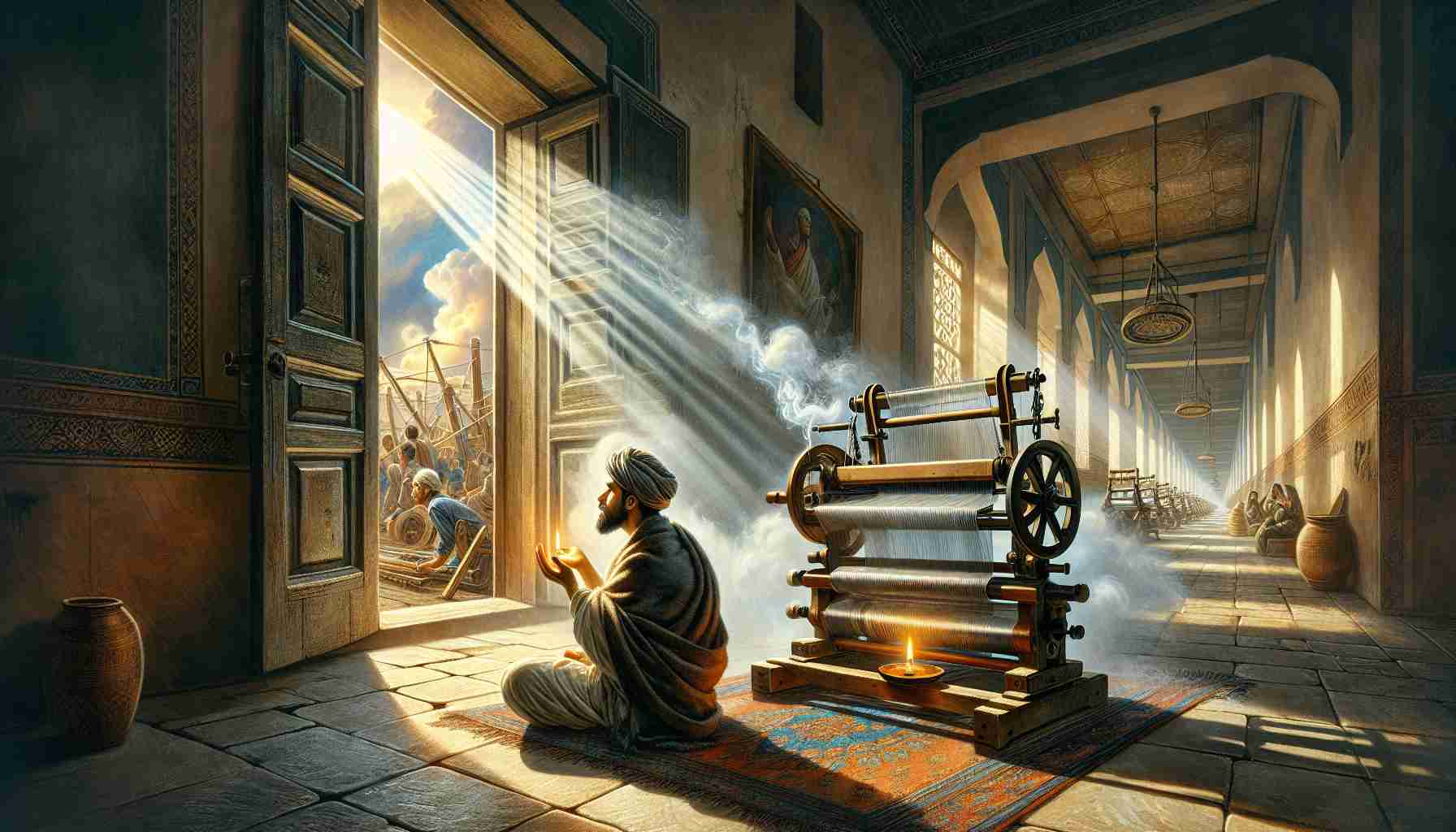

I am Manu, a weaver from Kanchipuram, known for our silk saris and devotion to the Divine. My hands have tied thousands of threads, but it was my heart that came undone the day the loom broke.
It was monsoon season. The rain tapped against our tiled roof like impatient fingers. My son had just turned fifteen, and I had planned to teach him the family trade. But as the final warp thread snapped and the wooden frame split along its base, the old loom—same one my father had used—fell silent. We had no money for repair. Orders were pending. Customers grew impatient. I found myself waking at dawn not to weave, but to worry.
Everything I had worked for, everything I had hoped to pass on, had crumbled in one moment. “Why now?” I often whispered to the silence of my workroom. I did not know what I was asking, only that I was afraid.
One morning, I walked to the temple of Kamakshi Devi—the goddess who watches over our town. I had not gone in many months. Shame, perhaps. Pranams — respectful bows — felt foreign after weeks of inner anger. Still, I sat on the cool stone floor and looked at the flickering flame of the diya. A verse from the Bhagavad Gita floated through my mind, uninvited: “Whenever dharma declines, and adharma rises, I will manifest myself.” (Gita 4.7)
It was not an answer, exactly. But it reminded me: the Divine appears most clearly in imbalance—and perhaps even in endings.
Next day, out of habit more than hope, I walked to the local tea stall. As I reached for my wallet, the shopkeeper, an elderly man with a gentle stutter, waved me off. “No money,” he said. “For you — today, gift.” I hadn’t shared my troubles. Still he saw something in my face, perhaps, or my silence. I drank slowly, looking at the marketplace through rising steam.
Then I saw it—an old warehouse near the ghat, its door open and people moving in and out. A boy handed out flyers: “New weaving collective — join us. Free use of shared looms.”
Something inside me resisted. Pride, most likely. But another verse from the Upanishads whispered through me: “As one door closes, another opens unto the self.” (Chandogya Upanishad 6.14)
I walked in.
There were ten looms. Modern. Fast. Foreign to my fingers, yet... willing to teach. I stayed. I brought my son. We learned side by side. I saw him smile as he tied his first warp.
The Mahabharata tells us that Arjuna could not see his path clearly until Lord Krishna revealed it. Sometimes, clarity waits on the other side of surrender.
Now, every time I watch the threads rise and fall under my son’s hands, I understand.
The loom didn’t fail me. It freed me.
The closed door wasn’t the end. It was the hand that turned me gently toward the light.
I am Manu, a weaver from Kanchipuram, known for our silk saris and devotion to the Divine. My hands have tied thousands of threads, but it was my heart that came undone the day the loom broke.
It was monsoon season. The rain tapped against our tiled roof like impatient fingers. My son had just turned fifteen, and I had planned to teach him the family trade. But as the final warp thread snapped and the wooden frame split along its base, the old loom—same one my father had used—fell silent. We had no money for repair. Orders were pending. Customers grew impatient. I found myself waking at dawn not to weave, but to worry.
Everything I had worked for, everything I had hoped to pass on, had crumbled in one moment. “Why now?” I often whispered to the silence of my workroom. I did not know what I was asking, only that I was afraid.
One morning, I walked to the temple of Kamakshi Devi—the goddess who watches over our town. I had not gone in many months. Shame, perhaps. Pranams — respectful bows — felt foreign after weeks of inner anger. Still, I sat on the cool stone floor and looked at the flickering flame of the diya. A verse from the Bhagavad Gita floated through my mind, uninvited: “Whenever dharma declines, and adharma rises, I will manifest myself.” (Gita 4.7)
It was not an answer, exactly. But it reminded me: the Divine appears most clearly in imbalance—and perhaps even in endings.
Next day, out of habit more than hope, I walked to the local tea stall. As I reached for my wallet, the shopkeeper, an elderly man with a gentle stutter, waved me off. “No money,” he said. “For you — today, gift.” I hadn’t shared my troubles. Still he saw something in my face, perhaps, or my silence. I drank slowly, looking at the marketplace through rising steam.
Then I saw it—an old warehouse near the ghat, its door open and people moving in and out. A boy handed out flyers: “New weaving collective — join us. Free use of shared looms.”
Something inside me resisted. Pride, most likely. But another verse from the Upanishads whispered through me: “As one door closes, another opens unto the self.” (Chandogya Upanishad 6.14)
I walked in.
There were ten looms. Modern. Fast. Foreign to my fingers, yet... willing to teach. I stayed. I brought my son. We learned side by side. I saw him smile as he tied his first warp.
The Mahabharata tells us that Arjuna could not see his path clearly until Lord Krishna revealed it. Sometimes, clarity waits on the other side of surrender.
Now, every time I watch the threads rise and fall under my son’s hands, I understand.
The loom didn’t fail me. It freed me.
The closed door wasn’t the end. It was the hand that turned me gently toward the light.